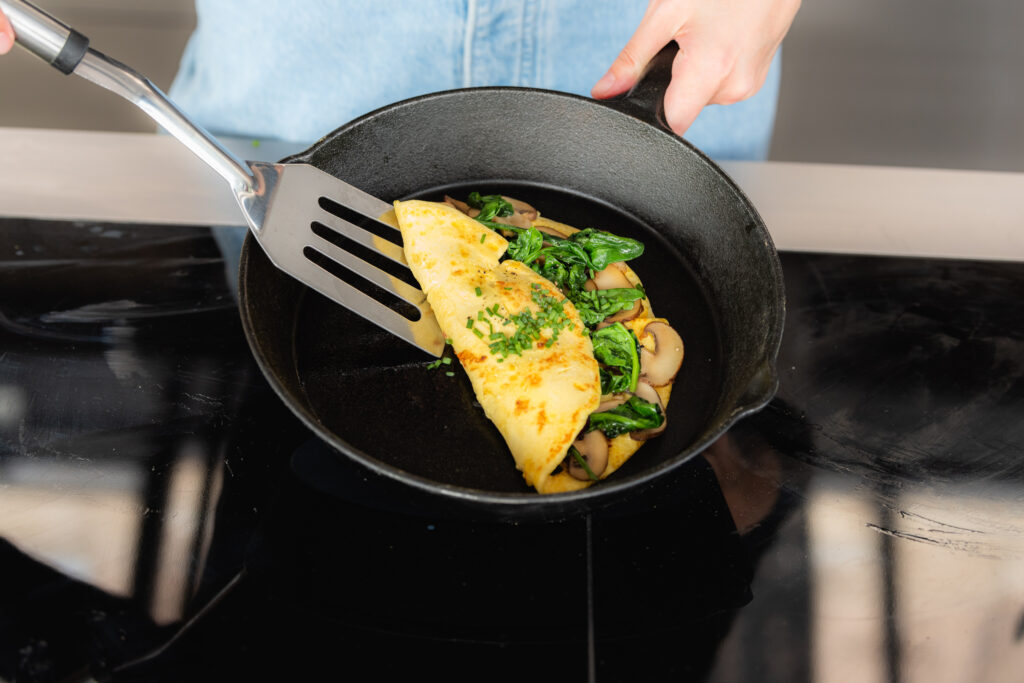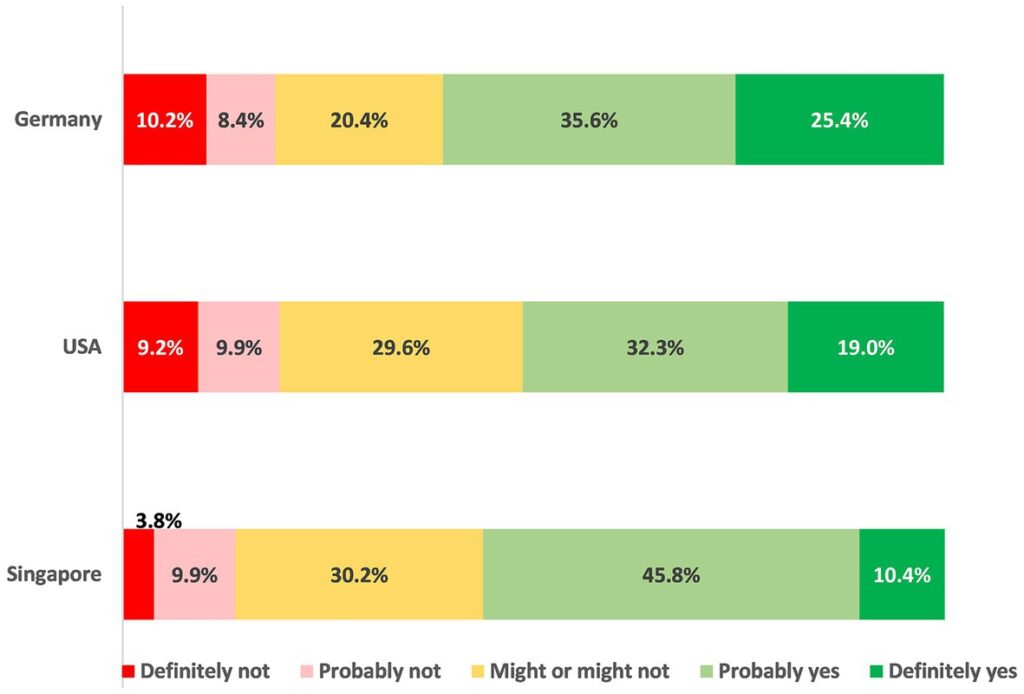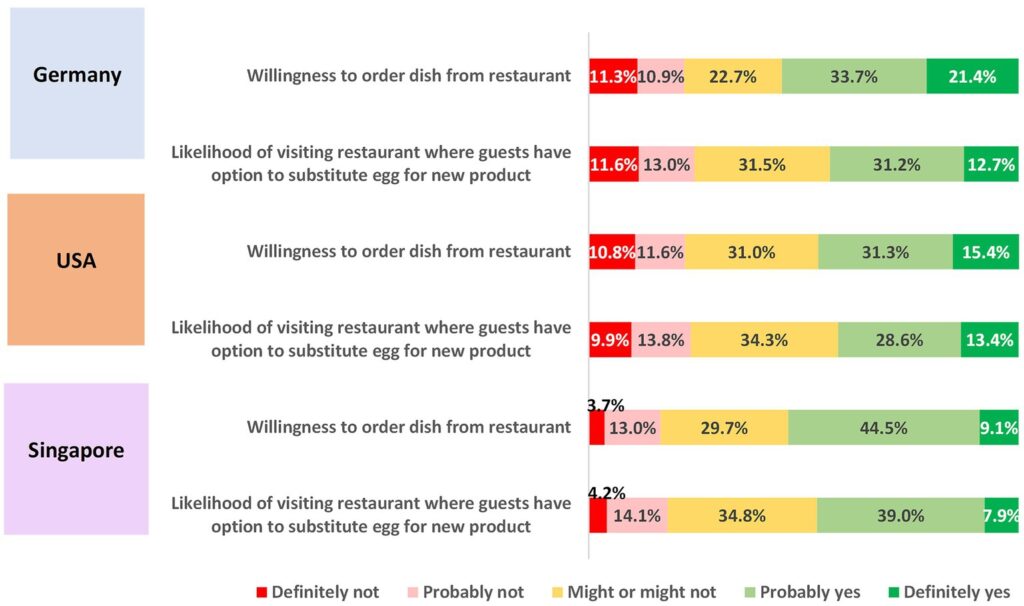Exclusive: Formo Spills the Yolk on Soon-to-Launch ‘Lab-Brewed’ Egg Alternative & Why Consumers are Curious About Precision Fermentation
9 Mins Read
German precision fermentation startup Formo will unveil its ‘lab-brewed’ alternative to eggs in foodservice in their home market later this year. Formo CEO Raffael Wohlgensinger and researcher Oscar Zollman Thomas speak to Green Queen exclusively about launching the first such egg alternative in Europe, the use of non-novel proteins under EU regulations, and its research into consumer acceptance of such products.
After years of working with animal-free dairy proteins, Formo will be debuting an alternative to eggs made via precison fermentation alongside its first cheese alternative, dubbed ‘Frischhain’, in its home city of Berlin. The company says the products will be available at various hotels, restaurants and cafés, before they eventually move into retail next year.
Formo – one of five founding members of the Food Fermentation Europe alliance – is calling the product ‘What Came Third’. Green Queen founder Sonalie Figueiras got a first taste of the product in a private event in April. At the time, the alt-eggs were in a powdered form, and could be mixed with water to resemble a beaten egg mix.
The company confirms they are debuting the same product, which has undergone iteration cycles since and is now ready for commercial production. As for the product format, Formo says it depends on the needs of its foodservice partners, who will use the egg alternative in various prepared dishes. “The first step is educating the world about these amazing products, and that’s best done with an experience that is as close to eggs as possible,” Formo CEO Raffael Wohlgensinger tells Green Queen.
EU novel food regulation
Formo’s protein is made using a microbe called Aspergillus oryzae – more commonly called koji mould. But the company’s ingredient isn’t an identical replica of egg proteins like ovalbumin or ovotransferrin – instead, it’s a protein that offers the same functional properties. “This is all down to the structure of the protein, meaning our products taste and behave identically to eggs,” Wohlgensinger explains.
In the EU, many products made with precision fermentation fall under the bloc’s novel food regulatory framework, requiring regulatory approval for commercial sale. The application process is a lengthy one, and can take several years. Wohlgensinger confirms that Formo’s protein is not classed as a novel food under these rules, so doesn’t need to pass any regulatory processes. “We’re producing the primary ingredient, our protein, through precision fermentation, but without the usage of synthetic biology tools that would be considered genetic engineering,” he says.
“Our protein components are considered non-novel in the EU, given a longstanding history of consumption,” he adds. Koji mould is known as Japan’s “national fungus”, and is used in many traditional fermented foods like miso, mirin, shoyu and alcoholic beverages like shochu and soju. “We’ve been in contact with a number of national Food Safety Authorities who have confirmed this assessment… Formo has an unwavering commitment to food and product safety, and we diligently adhere to all applicable food safety rules and regulations, whether at the EU or national level.”

The price premium on precision fermentation egg
Formo’s alternative to eggs will be manufactured in Germany, and the company has entered partnerships to scale the production of its ingredients and products. In a statement coinciding with the launch, Wohlgensinger had said: “Our decision to forge into the egg market reflects both our conviction in our protein production platform, and our end products’ ability to go toe-to-toe with conventional products. Societies around the world are waking up to the reality of industrial livestock farming, and we recognise our power to address it.”
Egg production is linked to animal exploitation, with many mass-manufacturing facilities placing the chickens in small cages and crowded spaces. Even cage-free birds have similar areas to play with, living with thousands of others in a stressful environment that can lead to feather loss, bleeding and death due to frequent pecking. Forma says about 60% of the world’s chickens reside in factory farms.
Moreover, chicken eggs have a carbon footprint of 2.7kg of CO2 equivalent per dozen, a value similar to conventional milk. They require a hefty amount of water too- it’s been found that 53 gallons of water are needed to produce a single egg, as chickens require water-intensive grain feed.
Wohlgensinger tells us that the new precision fermentation alt-egg will initially carry a price premium compared to its chicken-derived counterpart, “especially considering the industrial infrastructure and government subsidies” linked to conventional egg production. He likens it to a similar scenario encountered by clean energy: “Just like the solar panels of yesteryear though, we’re anticipating rapidly decreasing the costs associated with our products.”
Peer-reviewed study finds positive consumer acceptance rates
The launch of Formo’s alt-eggs comes after the company commissioned a peer-reviewed study that found that a majority of consumers are willing to try these products. The company collaborated with the Singapore Management University (SMU) to measure people’s interest in egg alternatives made from precision fermentation. In the 3,006-consumer survey – which spanned Germany, Singapore and the US – between 51-61% of respondents indicated an interest in trying such products.
The results, published in the Frontiers journal earlier this month, varied across countries – with Germans accounting for the highest amount of interest (61%) in trying precision-fermented egg products. Lead author and Formo researcher Oscar Zollman Thomas explains that this stronger appeal in Germany reiterated the company’s belief that it was the right market to launch in.

“We’re in Europe, the home of cheese and deep lovers of food culture,” he tells Green Queen. “It’s no coincidence that Formo was born here, and as a European country, we always wanted to be as close to our consumers as possible, taking them on the journey of realising the beauty and magic of precision fermentation.”
Singapore came second on the list, with 56% of its citizens saying they would try these eggs, followed by the US at 51%. This order was the same when it came to the willingness to purchase these products, with 57.2% of Germans saying ‘probably’ or ‘definitely’ yes, followed by 48.1% of Singaporeans and 47.9% of Americans.
It’s intriguing that the only two countries that approve the sale of another cellular agriculture product – cultivated meat – have a lower consumer acceptance rate than Germany. “We need to remind ourselves that the fundamental part of our industry – and this research – represents not consumers’ relationship to technology, but consumers’ relationship to food,” explains Zollman Thomas.
“The US and Singapore both represent countries where egg production occurs on a greater scale, and with lower welfare standards than Germany. The problems people see with egg production are lower in Germany than the other countries,” he adds.
Interestingly, when it comes to repeat purchases, Americans (30.5%) said they were more willing to buy precision-fermented eggs regularly than people in Singapore (25.6%). Germany (34.2%) still topped the list, albeit with a lower gap.
Foodservice trends and reasons for consumer interest

In terms of foodservice, 55.1% of Germans said they are willing to try a dish using these animal-free eggs in a restaurant, followed by Singaporeans (53.6%) and Americans (46.7%). But when it comes to the likelihood of visiting a restaurant where guests can substitute conventional eggs with alternatives made via precision fermentation, Singapore led the way with 46.9%, with Germany (44.9%) and the US (42%) not far behind.
The study found that those who consume organic or plant-based eggs were the group most willing to try these novel eggs, while vegans and vegetarians showed higher interest than flexitarians in all countries. “We importantly saw over half of the respondents offering that they’d be open to consuming lab-brewed eggs, being far above the 25% threshold that precipitates broad societal change,” explains Zollman Thomas.
The reasons for interest are different from region to region. In Germany, the top three factors were better animal welfare (22%), curiosity (18.2%), and less use of antibiotics (8.8%). In the US, curiosity (18.1%) was followed by health (11.6%) and the fact that these products contain no cholesterol (10.1%). And in Singapore, the top three factors were price (17.1%), health (14.8%), and curiosity (13.5%).
Clearly, consumer curiosity is a popular reason when it comes to interest in precision fermented egg alternative products. It’s this precedent of consumption and the development of non-novel proteins that Formo banked on for the forthcoming launch of its precision fermentation egg alternative.
Why precision-fermented dairy is more popular

Formo previously partnered with the University of Bath and Mercy for Animals, as well as the University of Saskatchewan, on joint studies that revealed positive consumer sentiment around precision fermentation dairy. Another report by Formo and the University of Bath in 2021 found that 79% of consumers were likely to try precision-fermented dairy products, a much higher share than this new study has found for animal-free eggs.
Speculating the reason behind this difference, the researchers said this could simply be because dairy is the most established product category in precision fermentation. “There’s simply more awareness around the environmental and animal welfare issues surrounding dairy production than for chickens,” notes Zollman Thomas.
It could also be due to novelty or ‘naturalness’ – the study noted that conventional eggs and meat are considered unprocessed ingredients, while for most consumers, cheese already appears processed, which may be why the idea of precision-fermented cheese is easier to digest.
“There are no egg alternative products on the market that have allowed for a level of societal reflection yet,” states Zollman Thomas. “Lab-brewed eggs will definitely initially speak to a smaller group than lab-brewed dairy, but the core issues with egg production are much the same as those with dairy, so we expect there will be a quick catchup.”
“This research demonstrates an appetite for precision-fermentation-made products, such as lab-brewed eggs, and that consumers are ready to both recognise the flaws of industrial egg production and adopt alternatives,” Zollman Thomas said last week in a statement.
“Cellular agriculture has the potential to revolutionise the way we produce and consume protein, addressing the environmental and ethical concerns associated with traditional animal agriculture,” said Professor Mark Chong, SMU’s lead researcher on the project. “Seeing appeal across the continents demonstrates cellular agriculture’s capacity to create not a localised, but a global food system shift.”
Developments in the precision-fermented egg sector

Formo – which was formerly known as Legendairy Foods and raised a record-breaking $50M in Series A funding in 2021 to bring total financing to $54.7M – isn’t the only company making animal-free alternatives to eggs. Californian startup The Every Company (formerly Clara Foods) has been working in the precision fermentation sector since 2014. In 2021, it unveiled its ClearEgg protein, months before raising $175M in an oversubscribed Series C round. As part of its collaborations with other brands, its bioidentical egg white protein has been featured in smoothies, macarons and canned cocktails.
Within the EU, Finland’s Onego Bio is working on egg proteins from precision fermentation. But Formo’s What Came Third alternative will be the first of its kind to launch in Europe.
Zollman Thomas pinpoints three aspects that are key to the success of the precision fermentation industry: awareness, desirability and credibility. “Research like [ours] shows that there’s a huge market already, it’s just a question of getting the message out, setting expectations, and making people buy into the vision of what companies like Formo are trying to do,” he says.
“This means being incredibly mindful of the trust we ask people to extend to us as an industry, and what we promise in terms of the products, companies and world we want to build with precision fermentation,” he adds. “People will only buy the products if they’re good enough, but equally, only if they believe in us.”




